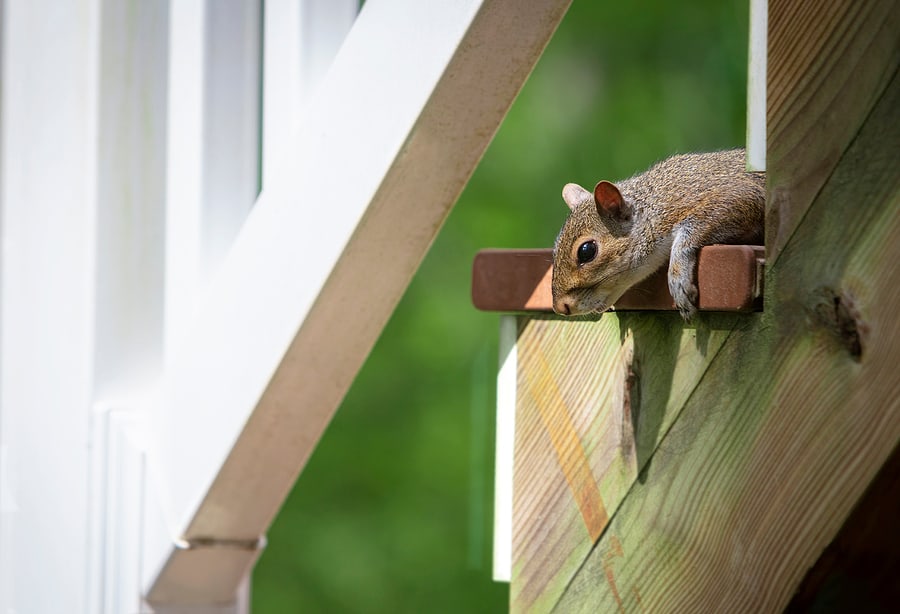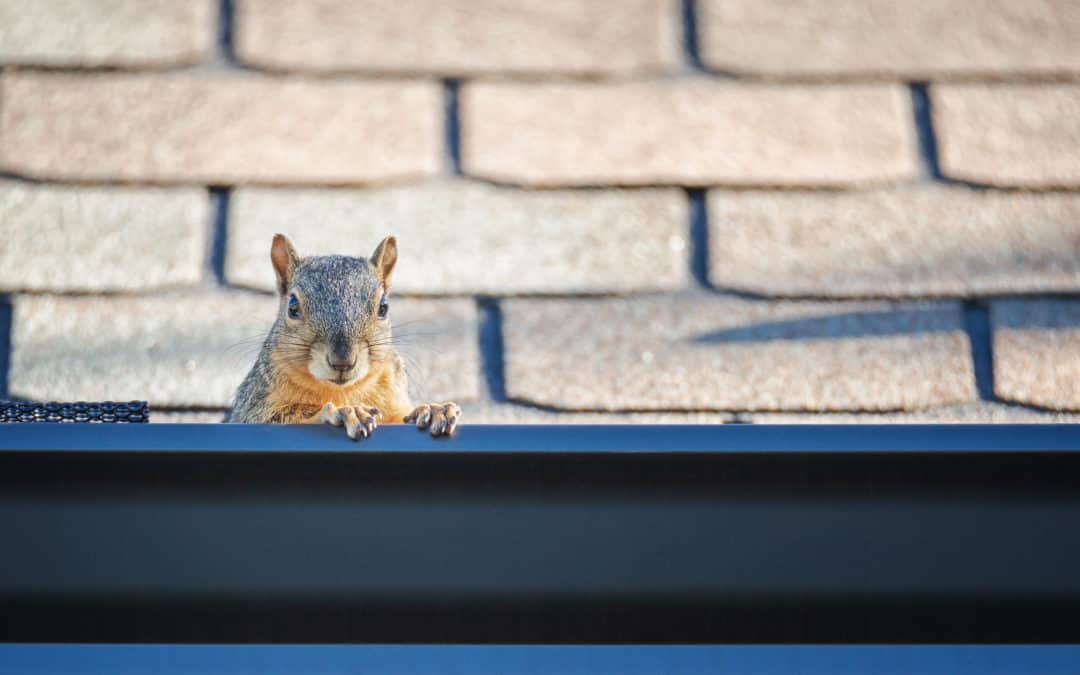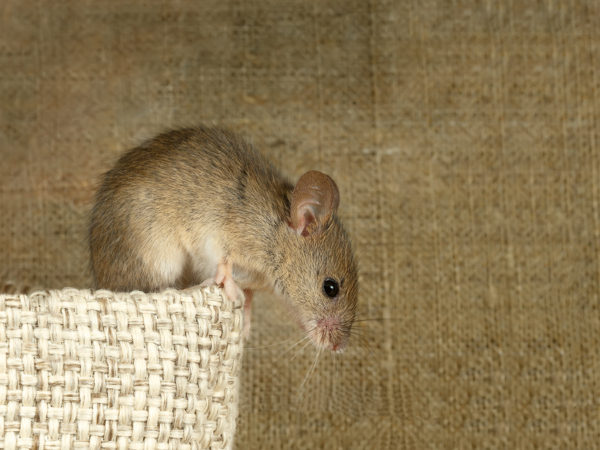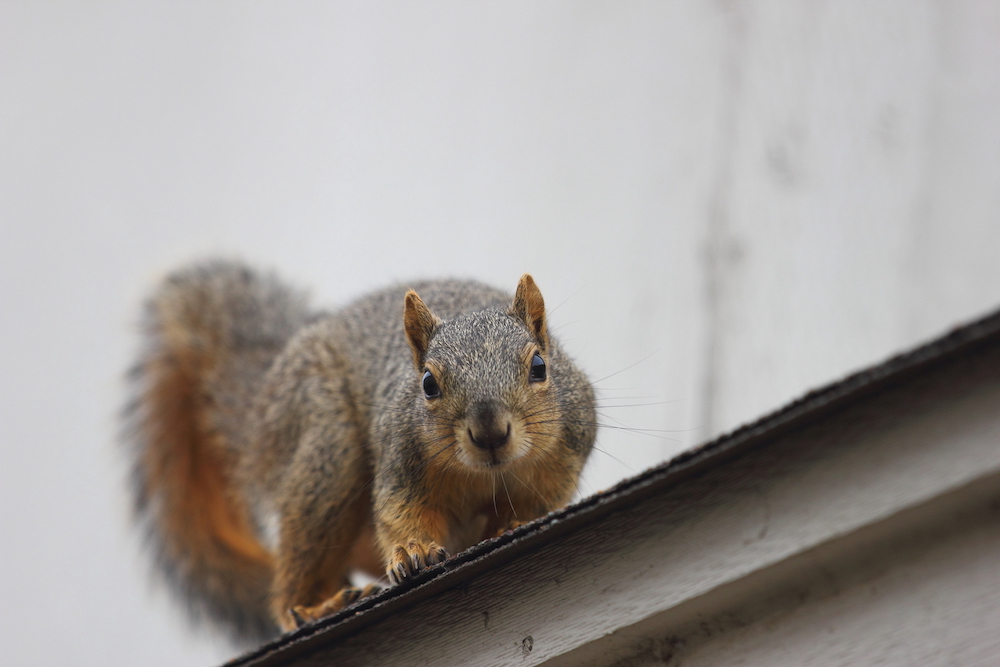READY TO GET STARTED?
REQUEST A FREE ESTIMATE
Fill out the form below or call (888) 466-7849 for a free, no-obligation estimate.

While many of us deem squirrels as cute and cuddly, the moment they start to invade our homes, we soon lose that fondness for wanting them around. As the weather begins to cool down, these pests will look towards houses, specifically attics, to create a nest and keep warm. Once inside, squirrels can cause major damage, such as chewing on electrical wires, destroying insulation, and leaving behind their droppings and urine. Luckily, there are a few ways to deter these creatures from your house. Check out these squirrel control tips you can use at home.
Trees and limbs can give squirrels easy access to your roofline. To prevent squirrels from gaining access, make sure that your tree limbs are cut back and trimmed away from the roofline. By cutting these access points, it’s an easy way to keep them away from your attic, chimneys, and any open holes or gaps leading inside the house.
Cleaning up around your home can also help to prevent these squirrels from entering your property. Squirrels are omnivores, meaning they will eat both meat and plants, including fruits, nuts, and small insects. To prevent them from scavenging for food around your house, make sure to dispose of garbage regularly while always using a sealed container. If you have any fruit trees on your property, try to look out for any ripe fruit and dispose of or pick them promptly.
Getting rid of squirrels can be difficult, and it can often take a trained professional who has the expertise to help prevent and eliminate them. If utilizing preventative measures fails and squirrels have invaded your property, consider reaching out to your local wildlife control company where they can provide you with the most effective trapping and removal methods for these rodents.

Squirrels are classified as rodents making them distant cousins to other more popular species like rats and mice. Like their rodent counterparts, squirrels can cause damage to your home and spread diseases to you and your family. Squirrels can access your home through small openings such as open doors and windows, down chimneys, through fireplaces, and through holes or openings in roofs or eaves. Once inside, these pests can chew through wires, siding, and insulation, causing costly damage and putting you at risk of fire. To keep these nuisance pests out, here are five ways to deal with a squirrel in your house.
The first step in dealing with squirrels is to figure out where they are getting into your home. Squirrels only need a small opening to squeeze through and once they are inside, getting them out can be difficult. Perform a thorough inspection of both the interior and exterior of your home, checking for holes, openings, and gaps that squirrels and other pests can use to gain access.
Once you’ve identified where the squirrels are getting in, seal it up to prevent them from using it again. If there is no presence of squirrels inside your home, go ahead and seal up ALL of the entry points you find. If there is a squirrel present, make sure to leave one entryway open so they have a way to get back out. Cover this last opening with a single sheet of newspaper. If it is still intact 2 to 3 days after you stop hearing the squirrel, it is safe to go ahead and seal it up. Make sure doors and windows are covered with screens and properly fit to your home. Place wire mesh over chimneys and open vents. Use caulk, steel wool, or other appropriate materials to seal any other openings you find.
Squirrels will often not leave your home on their own, especially if they have already given birth to a litter. To avoid this, try to drive the squirrels out as soon as you notice their presence. Playing loud music or keeping the lights on are both good ways to repel squirrels. If there is a squirrel present, try to avoid the area as you can spook them, causing them to flee to another part of the house, usually causing even more damage.
As a last resort, you can use traps to get rid of squirrels in your home. There are several different types of traps you can use. Live capture traps are a box-type trap that allows you to capture the squirrel alive and then release it outside. These traps have to be checked frequently and some states even require permits to use them. Kill traps are also box-type traps but eliminate the squirrel quickly and safely. Body-gripping traps can be used outside known entry points to capture the squirrels as they go in and out of your home.
As with any other type of pest control, prevention is key to keeping squirrels and other nuisance pests out of your home. The first step, as mentioned above, is to seal up any entry points around your home. Trim any overhanging trees that squirrels and other pests can use to access your roof, windows, and attic. Use traps as necessary.
If you have a problem with squirrels or any other pests, contact a professional pest control company who can help identify the type of pest you are dealing with, find potential entry points, and help prevent future infestations.

Rodents are one of the most common pests that come into our homes in the winter. Rodents are in search of 3 things – food, water, and shelter – and they can find all 3 of them in and around our homes. Squirrels, raccoons, rats, and mice are some of the most frequently seen rodents in the colder months. Rodents can cause significant damage to property and can also be a big health risk to humans. Prevention is critical in managing and preventing an infestation of rodents. Check out these tips to keep the rodents out this winter:

Hearing noises at night? You may have squirrels nesting in the attic, looking for shelter from the cold. To get rid of squirrels, first you have to determine how they’re getting in. This can be tricky if you don’t have easy access to your roof and since squirrels can sneak into small spaces. Contact a wildlife removal company to fully inspect your home for squirrel access points, set up traps, and correct any damage caused by squirrels. It’s also a good idea to keep trees trimmed and away from your roofline to cut off direct access.
Raccoons are common home invaders in the winter months, looking for refuge in crawl spaces, attics, and chimneys. Similar to squirrels, effective raccoon control requires professional expertise – to identify and seal entry points, trap and remove the raccoons, and prevent them from coming back with exclusion techniques. To prevent a raccoon invasion, eliminate food sources that attract them by using outdoor trash bins with lids and removing pet food when it’s not being eaten.
Mice are year-round pest nuisances that typically nest in attics, basements, cabinets, and closets. And because mice can fit through gaps as small as 1/4 inch, keeping them out can be difficult. As with other rodent control methods, the first step is to inspect your home for cracks, gaps, holes, or any other openings and correct them. Secondly, eliminate food sources and hiding places by keeping a clean house, removing clutter, and storing food in sealed containers. If you see small, dark-colored droppings anywhere, call an exterminator – quarterly pest control treatments are recommended to get rid of mice and prevent a future infestation.
Similar to mice, rats are common winter invaders, searching for food and warmth inside your home, needing holes as small as a quarter to get in. To prevent this, and other rodent invasions, seal any gaps or holes in your home’s foundation, around your roof, in the crawl space or basement, or around doors and windows, keep garbage away from your home’s exterior in sealed bins, and check for evidence of rats – usually indicated by droppings (larger than those left by mice), gnawing, or footprints and tail tracks.
Cockroaches, too, are looking for food and warmth during colder months. The best way to prevent roaches is with preventative pest control and by eliminating what attracts roaches – food left out, crumbs, pet food and water, clutter, and water leaks.
Common house spiders will start making their ways indoors starting in the cooler, Fall months. Prevent spiders with ongoing pest control treatments, by eliminating clutter (spiders like to hide in dark, undisturbed places), and by knocking down cobwebs regularly.

Hearing noises at night? You may have squirrels nesting in the attic, looking for shelter from the cold. To get rid of squirrels, first you have to determine how they’re getting in. This can be tricky if you don’t have easy access to your roof and since squirrels can sneak into small spaces. Contact a wildlife removal company to fully inspect your home for squirrel access points, set up traps, and correct any damage caused by squirrels. It’s also a good idea to keep trees trimmed and away from your roofline to cut off direct access.
Raccoons are common home invaders in the winter months, looking for refuge in crawl spaces, attics, and chimneys. Similar to squirrels, effective raccoon control requires professional expertise – to identify and seal entry points, trap and remove the raccoons, and prevent them from coming back with exclusion techniques. To prevent a raccoon invasion, eliminate food sources that attract them by using outdoor trash bins with lids and removing pet food when it’s not being eaten.
Mice are year-round pest nuisances that typically nest in attics, basements, cabinets, and closets. And because mice can fit through gaps as small as 1/4 inch, keeping them out can be difficult. As with other rodent control methods, the first step is to inspect your home for cracks, gaps, holes, or any other openings and correct them. Secondly, eliminate food sources and hiding places by keeping a clean house, removing clutter, and storing food in sealed containers. If you see small, dark-colored droppings anywhere, call an exterminator – quarterly pest control treatments are recommended to get rid of mice and prevent a future infestation.
Similar to mice, rats are common winter invaders, searching for food and warmth inside your home, needing holes as small as a quarter to get in. To prevent this, and other rodent invasions, seal any gaps or holes in your home’s foundation, around your roof, in the crawl space or basement, or around doors and windows, keep garbage away from your home’s exterior in sealed bins, and check for evidence of rats – usually indicated by droppings (larger than those left by mice), gnawing, or footprints and tail tracks.
Cockroaches, too, are looking for food and warmth during colder months. The best way to prevent roaches is with preventative pest control and by eliminating what attracts roaches – food left out, crumbs, pet food and water, clutter, and water leaks.
Common house spiders will start making their ways indoors starting in the cooler, Fall months. Prevent spiders with ongoing pest control treatments, by eliminating clutter (spiders like to hide in dark, undisturbed places), and by knocking down cobwebs regularly.